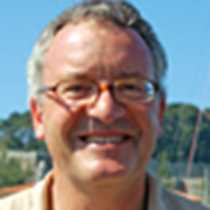Silves & Monchique
Our westerly course, marked by entering a new time zone, has brought us to Algarve, a popular holiday destination for Europeans on the southern coast of Portugal. Not many of those seekers of sun, sea and scenery will know or care that Algarve is Arabic for "the West" but for this particular group of travelers, it signifies closure for a voyage that began in the Red Sea at the heart of a distinctive civilization, Dar-al-Islam.
The Moors brought the new religion with them when they crossed the narrow entrance of the Mediterranean from the Barbary shores to the Iberian Peninsula back in the eighth century. Their last stronghold in the land that has since been known as Portugal was Silves and we visited the impressive remains of their fortified stronghold this morning in prefect weather and light conditions, with swifts screaming around the battlements and nesting storks on the towers. The town's archaeological museum, built around an impressive cistern discovered by archaeologists in the 1980s, was opened for us and there was much to remind us of the passage through history that this memorable voyage has comprised.
Our ride through the countryside to the spa town of Monchique was attended by more Arabesque memories. Irrigation channels and their attendant orange groves originated with the Moorish occupation of the Algarve as did the stylized chimneys and decorative tile-work on the local houses. At Monchique, some 900 feet above sea level in the granite hills, we saw cork oak groves that have offered a secure livelihood for local people in these parts, until the recent arrival - and market acceptance - of the screw-top wine bottle.
Irrigation is a topical subject in the Algarve these days with the scale of development along the coast having led to problems of water shortage. Environmental issues were the focus of our afternoon forum, and the ensuing lively debate was characteristic of a voyage that has been stimulating on multiple levels. As the discussion proceeded, we sailed westward around Cape St Vincent into the Atlantic Ocean bound for Lisbon.
Our westerly course, marked by entering a new time zone, has brought us to Algarve, a popular holiday destination for Europeans on the southern coast of Portugal. Not many of those seekers of sun, sea and scenery will know or care that Algarve is Arabic for "the West" but for this particular group of travelers, it signifies closure for a voyage that began in the Red Sea at the heart of a distinctive civilization, Dar-al-Islam.
The Moors brought the new religion with them when they crossed the narrow entrance of the Mediterranean from the Barbary shores to the Iberian Peninsula back in the eighth century. Their last stronghold in the land that has since been known as Portugal was Silves and we visited the impressive remains of their fortified stronghold this morning in prefect weather and light conditions, with swifts screaming around the battlements and nesting storks on the towers. The town's archaeological museum, built around an impressive cistern discovered by archaeologists in the 1980s, was opened for us and there was much to remind us of the passage through history that this memorable voyage has comprised.
Our ride through the countryside to the spa town of Monchique was attended by more Arabesque memories. Irrigation channels and their attendant orange groves originated with the Moorish occupation of the Algarve as did the stylized chimneys and decorative tile-work on the local houses. At Monchique, some 900 feet above sea level in the granite hills, we saw cork oak groves that have offered a secure livelihood for local people in these parts, until the recent arrival - and market acceptance - of the screw-top wine bottle.
Irrigation is a topical subject in the Algarve these days with the scale of development along the coast having led to problems of water shortage. Environmental issues were the focus of our afternoon forum, and the ensuing lively debate was characteristic of a voyage that has been stimulating on multiple levels. As the discussion proceeded, we sailed westward around Cape St Vincent into the Atlantic Ocean bound for Lisbon.



